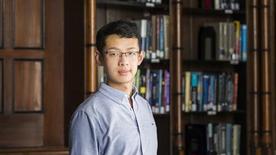
The Heising-Simons Foundation announced the inaugural class of 51 Pegasi b Fellows, named for the first exoplanet discovered orbiting a Sun-like star. Songhu Wang, a postdoctoral research scientist in Yale’s Department of Astronomy, is one of the four inaugural fellows.
The 51 Pegasi b Fellowship provides exceptional postdoctoral scientists with the opportunity to conduct theoretical, observational, and experimental research in planetary astronomy.
The growing field of planetary astronomy studies celestial objects both within and beyond our solar system, bridging planetary science and astronomy. From accelerating understanding of geological activity on Jupiter’s moon Io, to advancing new technologies for detecting Earth-like planets, 51 Pegasi b Fellows will make a unique contribution to the field of planetary astronomy.
At the age of 7, Wang would stay up to observe the dark sky in the remote region of China where he lived. Today he is on the leading edge of understanding exoplanet formation and evolution. He received a Ph.D. in astronomy from Nanjing University (China) in 2016 and was appointed a postdoctoral research associate at Yale University that same year.
Motivated by a desire to learn more about how our solar system fits into the galactic planetary census, and to probe the deepest questions about life and the origins of the universe, Wang measures subtle variations of starlight to detect and describe rare Earth-like planets in other solar systems. Wang is an expert in big data analysis and algorithms, and his observations have detected a range of exoplanets — including a rare six-planet configuration — plus hundreds of unusual stars and many stellar flare events.
“I think there are two drivers in this field: First is mankind’s curiosity about whether we are alone in the universe. Are there other planets like ours?” says Wang. “Another driver is our long-running pursuit of origins. How was our planetary system created? How was the Earth created? I want to contribute to answering all these questions.”
As a 51 Pegasi b Fellow, and under the mentorship of Professor Greg Laughlin, Wang will conduct studies to address unsolved puzzles in the exoplanet field, including learning the makeup of ubiquitous super Earths — exoplanets whose size is between that of Earth and Uranus. His work will involve characterizing the densities and compositions of super Earths; these studies are critical to evaluating the habitability of exoplanets, he notes. “I want to understand solar systems beyond our own, and learn how these systems evolve.”
Steven Girvin, Yale’s deputy provost for research and the Eugene Higgins Professor of Physics, said, “Yale is proud to count among its talented scientists an inaugural recipient of this prestigious new fellowship, and we are deeply grateful to the Heising-Simons Foundation for their recognition and support of leading science at Yale.”
The inaugural class of fellows and host institutions also includes: Jason Dittmann, Ph.D., Massachusetts Institute of Technology; Peter Gao, Ph.D., University of California-Berkeley; and Katherine de Kleer, Ph.D. candidate, Caltech. The fellowship provides:
- Up to $375,000 of support for independent research over three years
- Time and space to establish distinction and leadership in the field
- Mentorship by an established faculty member at the host institution
- An annual summit to develop professional networks, exchange information and ideas, and foster collaboration.
More information on the fellowship and fellows is at www.51Pegasib.org. The Heising-Simons Foundation is a family foundation based in Los Altos, California. The foundation works with its many partners to advance sustainable solutions in climate and clean energy, enable groundbreaking research in science, enhance the education of our youngest learners, and support human rights for all people. Learn more at www.heisingsimons.org.